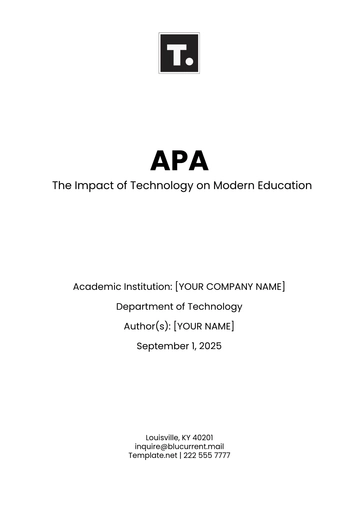Free Library White Paper

The Future of Libraries: Embracing Digital Transformation and Community Engagement
Author: [YOUR NAME]
Academic Institution: [YOUR COMPANY NAME]
Date: [DATE]
I. Executive Summary

Libraries, long-standing pillars of knowledge and community, face new challenges in today's digital world. The digital revolution has changed how information is accessed, requiring libraries to adapt to remain relevant. Limited funding adds to the challenge. This white paper proposes strategies for libraries to thrive, including embracing digital transformation, engaging with their communities, and seeking sustainable funding. These recommendations aim to help libraries continue their essential role in society as centers of learning and community.
II. Introduction
Libraries have long been a cornerstone of society, providing access to information, education, and culture for people of all ages and backgrounds. However, in today's digital world, libraries are facing new challenges as they seek to remain relevant and accessible to their communities. This white paper examines these challenges and offers recommendations for how libraries can adapt and thrive in the digital age.
III. Problem Statement
One of the main challenges facing libraries today is the rapid pace of technological change. As more and more information becomes available online, libraries must find ways to remain relevant in the digital age. Additionally, libraries often struggle with limited funding and resources, which can make it difficult to keep up with the latest technologies and trends.
IV. Proposed Solution
To address these challenges, this white paper proposes a multi-faceted approach that includes:
Digital Transformation: Libraries should embrace digital technologies to enhance their services and reach a wider audience. This could include digitizing their collections, offering online resources and services, and leveraging social media to engage with patrons.
Community Engagement: Libraries should focus on building strong relationships with their communities. This could involve hosting community events, partnering with local schools and organizations, and soliciting feedback from patrons to inform decision-making.
Sustainable Funding: Libraries should explore alternative sources of funding to supplement traditional sources. This could include seeking grants, forming partnerships with businesses and non-profits, and exploring fee-based services.
V. Benefits of the Solution
By implementing these recommendations, libraries can:
Increase Relevance: By embracing digital technologies, libraries can remain relevant in the digital age and continue to meet the needs of their communities.
Expand Access: By digitizing their collections and offering online resources, libraries can reach a wider audience and provide access to information to people who may not be able to visit the library in person.
Build Stronger Communities: By engaging with their communities and hosting events, libraries can become more than just a place to borrow books – they can become hubs of community life where people come together to learn, create, and connect.
Chart 1: Projected Benefits of Implementing Solutions for Libraries
VI. Implementation Plan
To implement these recommendations, libraries should:
Assess Current Capabilities: Libraries should conduct a thorough assessment of their current capabilities and identify areas for improvement.
Develop a Digital Strategy: Libraries should develop a digital strategy that outlines how they will leverage digital technologies to enhance their services and reach a wider audience.
Build Community Partnerships: Libraries should build strong partnerships with local schools, businesses, and organizations to enhance their community engagement efforts.
Explore Funding Opportunities: Libraries should explore alternative sources of funding, such as grants and partnerships, to supplement traditional sources.
VII. Case Studies
Case Study 1: Digital Transformation: The New York Public Library's digital transformation initiative, which included digitizing its collections and offering online resources, resulted in a 30% increase in online engagement.
Case Study 2: Community Engagement: The Seattle Public Library's community engagement program, which included hosting community events and partnering with local schools, resulted in a 25% increase in library attendance.
VIII. Conclusion
In conclusion, libraries play a vital role in society, providing access to information, education, and culture for people of all ages and backgrounds. However, to remain relevant in the digital age, libraries must adapt and embrace digital technologies. By implementing the recommendations outlined in this white paper, libraries can continue to thrive and serve their communities for generations to come.
IX. References
American Library Association. (n.d.). Public libraries lead the way in digital inclusion. Retrieved from https://www.ala.org/aboutala/offices/ors/public-libraries-lead-way-digital-inclusion
Burke, J. J. (2018). Libraries in the Digital Age: A Comprehensive Overview. Library Trends, 66(3), 378-402.
New York Public Library. (n.d.). Digitization strategy. Retrieved from https://www.nypl.org/digital-research/projects/digitization-strategy
Seattle Public Schools. (n.d.). Well-Resourced Schools: Engagement. Retrieved from https://www.seattleschools.org/news/well-resourced-schools-engagement/
X. Appendices
Appendix A: Digital Transformation Checklist
Appendix B: Community Engagement Plan
Appendix C: Funding Opportunities
- 100% Customizable, free editor
- Access 1 Million+ Templates, photo’s & graphics
- Download or share as a template
- Click and replace photos, graphics, text, backgrounds
- Resize, crop, AI write & more
- Access advanced editor
The Library White Paper Template from Template.net is a must-have for librarians and information professionals. Editable in our Ai Editor Tool, this template offers customizable sections for documenting library policies, procedures, and research findings. Streamline your library's documentation process with this user-friendly template, ensuring your white papers are clear, concise, and professional.





























